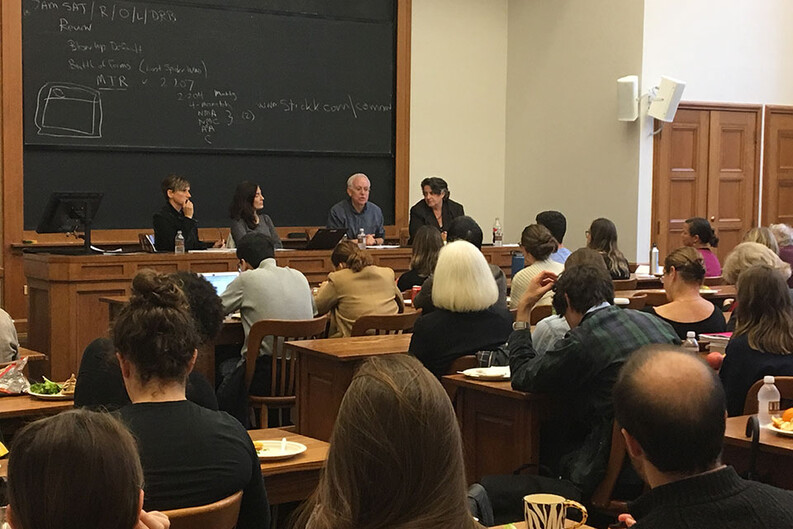Panelists Discuss Impact of Decision on Professional Speech and Reproductive Health

On October 15, 2018, the Solomon Center for Health Law and Policy, the Program for the Study of Reproductive Justice within the Information Society Project, the Global Health Justice Partnership, and a number of student groups co-hosted a panel discussion titled “Pregnancy, Power, and Professional Speech: NIFLA v. Becerra.”
Panelists included Yale Law School professors Robert Post ’77 and Amy Kapczynski ’03, along with Julie Rikelman, Senior Director for Litigation at the Center for Reproductive Rights. The panel discussed the June 2018 Supreme Court opinion in NIFLA v. Becerra, its effects on reproductive rights and professional speech, and the deregulatory uses of the First Amendment.
NIFLA involved a constitutional challenge to a California law regulating Crisis Pregnancy Centers (CPCs), centers typically set up by pro-life activist groups and nonprofits that present themselves as reproductive health clinics in an effort to dissuade patients seeking abortions from aborting their pregnancies. The law in question required CPCs to post written disclosures regarding the availability of reproductive services such as abortions at state-sponsored health clinics, and it required unlicensed CPCs to disclose their lack of medical licenses. The Court held in NIFLA that the California law violated the First Amendment by targeting CPCs to compel them to speak by posting information regarding the availability of other services such as abortion. The majority rejected California’s argument that under existing First Amendment jurisprudence, regulations of professional and commercial speech should be treated with a lower level of scrutiny than regulations of political speech and speech related to public discourse.
Post began the panel discussion reflecting on the dangers and legal complications of erasing the line between First Amendment protections for speech contributing to public discourse on the one hand and professional and commercial speech on the other. Post emphasized that in public discourse, the speaker is protected under the First Amendment, but in commercial speech, the protections tend to be listener-oriented. He stated that many professional regulations, such as those regarding the types of advice lawyers can provide, are forms of “compelled speech” and that the state has been permitted to regulate them.
Rikelman said that while the NIFLA decision is a blow to professional speech doctrine, there may be opportunities for pro-choice advocates to use NIFLA to challenge abortion restrictions that some states currently impose. Laws that are potentially vulnerable under the logic of NIFLA include those that require doctors to inform patients seeking abortions about adoption options, laws that require physicians to make false statements to patients seeking an abortion (such as the statement that abortions cause breast cancer or increase the risk of suicidal ideation), and laws that require doctors to describe in detail the ultrasound image of a fetus in an attempt to dissuade the pregnant person from continuing with the abortion, among others. All of these laws, in Rikelman’s view, would be compelled speech under the logic of NIFLA and would be similarly unconstitutional as long as courts apply NIFLA in good faith.
Kapczynski then argued that the expansion of First Amendment rights into areas that traditionally do not warrant First Amendment scrutiny — like commercial speech — is actually a concerted effort to dismantle the regulatory state, which is built, in large part, on disclosure laws and compelled speech. (For example, the government requires food producers to include ingredients and calorie information on their products, clothing manufacturers to label their clothing with information regarding the composition and place of manufacture, drug companies to include accurate information on labels of the drugs they market, and so on.) According to Kapczynski, this expansive application of First Amendment rights has emerged in numerous cases and jurisdictions, with judges striking down laws prohibiting pharmaceutical salespeople from talking to doctors without the doctors’ consent and laws that require graphic warnings of lung cancer on packs of cigarette, and with recent legal challenges to laws that prohibit marketing of drugs beyond their FDA-approved purposes.
Overall, the panelists agreed that the NIFLA decision advances an incoherent doctrine for free speech that is inconsistent with historical frameworks of the First Amendment. Furthermore, they agreed that there is a significant deregulatory trend that the courts, and especially the Supreme Court, are advancing by using the First Amendment to strike down regulations that historically have been accepted as constitutional and legitimate. The panelists suggested that to reverse this trend a combination of political action and litigation will be essential. They also proposed the possibility that regulation should evolve to rely less on required disclosures and more on direct interventions (such as regulating nicotine content of e-cigarettes instead of requiring disclosure of the risks of smoking).


